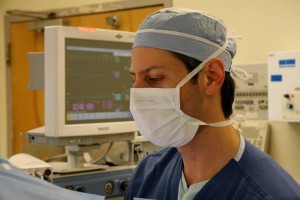November 13th, 2015
Procedural Competency
Briana Buckner, MD

Briana Buckner, MD, is a 2015-16 Chief Resident in Internal Medicine at the University of Pennsylvania in Philadelphia.
It’s 2 am, and the patient’s blood pressure is beginning to rapidly decrease. Every IV line is occupied by an antibiotic or IV fluids, and we are in need of a vasoactive medication. The nurse comes to my computer and sternly states, “We can no longer avoid it. I think the patient needs a central line.” I quickly say “OK,” but I don’t move. I am momentarily frozen by my unease with the bedside procedure ahead. My mind is racing and questioning whether I can make any other treatment or management decision to avoid this procedure. I’ve got nothing. This is definitely what the patient needs. The nurse asks, “Are you signed off?”
I reply earnestly, with a strong “yes,” to convey to her that I am confident in my skills and comfortable. The honest reality is that I am nervous about doing this central line procedure and am finally facing my procedural comfort level straight on. Although I met the institutional requirement for quantity of this procedure needed for unsupervised performance of this skill, my comfort had waned in the few months since I had performed the procedure.
The real question I faced that night as a second-year resident was whether my level of comfort reflected my competency and ability to complete the procedure safely. If we assume that comfort reflects competency, our current quantitative benchmarks for performing unsupervised procedures may not be enough. In one prospective study of residents’ comfort with 9 aspects of 4 common bedside procedures, the residents reported lack of comfort in at least one aspect of 51% of procedures performed over the course of a year (1). Higher procedure numbers and direct supervision were associated with greater comfort.
What feels like a recent development of more physicians being less comfortable with bedside procedures may really be a result of procedures transitioning primarily into the hands of specialists. A survey of internists from the American College of Physicians showed that primary internists regularly performed 16 in-office procedures in 1986, versus 7 in 2004 (2). There has also been a recent movement to provide procedure-service models on many inpatient services that serve as exemplary models of procedure execution. These models offer expert supervisors, consistent teaching technique, and a controlled environment for the patient. Although these models are a plus for the patient, some would argue procedure services are performing procedures that previously would have been performed by trainees — the same trainees who must develop into our next generation of experts.
So how do these issues affect our journey to procedural safety for our patients and the training of future procedural experts? In recent years, the American Board of Internal Medicine has transitioned away from quantitative requirements to determine if physicians-in-training are ready for unsupervised performance of skills and has implemented milestone-based assessments. These milestone- and competency-based assessment tools require trainees to demonstrate effective mastery of needed technical skills and to understand and be able to manage complications (in addition to reaching a defined number of each procedure). Although the ABIM has embraced milestone-based evaluation, many of our training programs continue the longstanding “signed off” culture after 5 or so of a common procedure are performed. Which, in my case, was not the point of comfort and may have not been the point of competency. As procedural training often is considered one of the most important aspects of training, I hope with innovation and diligence we can continue to train competent procedural experts.
Do you have thoughts on bedside procedural comfort or competency? How can we improve procedural training? Please feel free to share your comments.
References:
- Huang GC et al. Beyond the comfort zone: Residents assess their comfort performing inpatient medical procedures. Am J Med 2006 Jan; 119:71.e17.
- Wigton RS and Alguire P. American College of Physicians. The declining number and variety of procedures done by general internists: A resurvey of members of the American College of Physicians. Ann Intern Med 2007 Mar 6; 146:355.



This is a very thoughtful summary of the issues involved in learning and doing procedural skills. Having one’s own doctor do procedures can be a comfort to patients, but time demands, growth of specialties and procedural teams have changed the landscape, (perhaps less so for hospitalists). Simulations and milestone evaluations should help, but without some deliberate change in training and practice, the number of procedures done by primary care doctors may continue to decrease.
June 29, 1985. My first night on call as an Internal medicine intern. Call from medical ICU (green) nurse at 3am. 66 y.o. pt. in for heart and renal failure. Blood pressure dropping, no central line in place. I had placed one, supervised, 2 years ago as a 3rd year med. student. I call my supervising 3rd year resident. He won’t come and makes it clear he doesn’t want to be bothered again(he’s finishing the residency and leaving in 2 days). I decide I WON”T try to place the central line unsupervised. I temporize with dobutamine, then albumin ( I had a great ICU teacher in med school). I didn’t want to call the attending at 3:30 am. Attending shows up at 7 am and places the central line. He wasn’t too happy. The patient survives and walks out of the ICU a few days later.
Looking back on it, I now consider the senior resident’s behavior so unethical that I wouldn’t have let him complete the residency. He’s still practicing, as a gastroenterologist.
It’s Gladwell’s 10,000 hours.